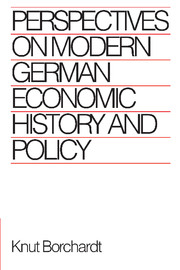Book contents
- Frontmatter
- Contents
- List of figures
- List of tables
- Preface to the English edition
- Preface to the German edition
- List of original chapter titles and first places of publication
- Abbreviations
- 1 Protectionism in historical perspective
- 2 Was there a capital shortage in the first half of the nineteenth century in Germany?
- 3 Regional variations in growth in Germany in the nineteenth century with particular reference to the west—east developmental gradient
- 4 Investment in education and instruction in the nineteenth century
- 5 Changes in the phenomenon of the business cycle over the last hundred years
- 6 Trends, cycles, structural breaks, chance: what determines twentieth-century German economic history?
- 7 The Federal Republic of Germany in the secular trend of economic development
- 8 Germany's experience of inflation
- 9 Constraints and room for manoeuvre in the great depression of the early thirties: towards a revision of the received historical picture
- 10 Economic causes of the collapse of the Weimar Republic
- 11 Germany's exchange rate options during the great depression
- Notes
- Index
4 - Investment in education and instruction in the nineteenth century
Published online by Cambridge University Press: 10 December 2009
- Frontmatter
- Contents
- List of figures
- List of tables
- Preface to the English edition
- Preface to the German edition
- List of original chapter titles and first places of publication
- Abbreviations
- 1 Protectionism in historical perspective
- 2 Was there a capital shortage in the first half of the nineteenth century in Germany?
- 3 Regional variations in growth in Germany in the nineteenth century with particular reference to the west—east developmental gradient
- 4 Investment in education and instruction in the nineteenth century
- 5 Changes in the phenomenon of the business cycle over the last hundred years
- 6 Trends, cycles, structural breaks, chance: what determines twentieth-century German economic history?
- 7 The Federal Republic of Germany in the secular trend of economic development
- 8 Germany's experience of inflation
- 9 Constraints and room for manoeuvre in the great depression of the early thirties: towards a revision of the received historical picture
- 10 Economic causes of the collapse of the Weimar Republic
- 11 Germany's exchange rate options during the great depression
- Notes
- Index
Summary
Since the 1950s, economic theorists have ceased to regard private and public expenditure on upbringing and instruction as consumption, as they had done previously, but at least in part as investment. They realised that labour was not an original factor of production, and that wages also include an element of interest or rent. Individual ability, knowledge and capabilities were no longer held to be the result of birth, but required for their development the input of means of production. The accumulated ‘investments’ finally resulted in the resource ‘human capital’, whose productivity could now be evaluated. We now speak of education as being one among many other sectors of the economy, which may be analysed in economic terms.
This trend in scholarship, which has become something of a fashion, produced considerable changes in economic theory and economic policy. Whereas originally in the theory of growth, the formation of real capital and a somewhat unspecified ‘technical progress’, stood at the centre of attention, authors like T. W. Schultz, E. F. Denison, F. Machlup and others have succeeded in accommodating as an explicit variable in econometric research changes in the quality of labour, of its knowledge and ability. No wonder that the training and development of manpower in developing countries has now also become a focal point of aid provided by wealthy countries, and that the discussion of education in the Federal Republic has been enriched by terms derived from the discipline of economics.
- Type
- Chapter
- Information
- Publisher: Cambridge University PressPrint publication year: 1991



